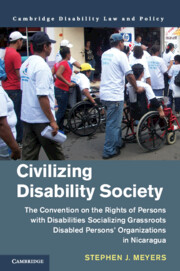 Civilizing Disability Society
Civilizing Disability Society Published online by Cambridge University Press: 27 September 2019
The adoption of the UN Convention on the Rights of Persons with Disabilities (CRPD) in 2006 engendered a global social movement to promote disability rights around the world. A central aim of this movement has been to support Disabled Persons Organizations’ (DPOs) human-rights work. This focus on advocacy has now become a new organizational norm disseminated from international donors, networks, and NGOs to grassroots DPOs through training and small grants provided to DPOs in the Global South. In many places, however, local DPOs have resisted the changes this new norm implies, instead seeking to continue their traditional focus on addressing their members’ concrete needs through material support and services. In Segovia, Nicaragua, seven grassroots DPOs share an internationally funded grant for rights advocacy. They struggle, however, to use the money to address their local members needs while also keeping the international donor happy. This disconnect between international norms and local associations is the result of Nicaragua’s history of mobilizing people for the purposes of addressing basic needs and promoting community development. Since the 1979 Sandinista Revolution, local citizens, including disabled persons, have joined grassroots groups in solidaridad in coming together for mutual aid and social support.
To save this book to your Kindle, first ensure [email protected] is added to your Approved Personal Document E-mail List under your Personal Document Settings on the Manage Your Content and Devices page of your Amazon account. Then enter the ‘name’ part of your Kindle email address below. Find out more about saving to your Kindle.
Note you can select to save to either the @free.kindle.com or @kindle.com variations. ‘@free.kindle.com’ emails are free but can only be saved to your device when it is connected to wi-fi. ‘@kindle.com’ emails can be delivered even when you are not connected to wi-fi, but note that service fees apply.
Find out more about the Kindle Personal Document Service.
To save content items to your account, please confirm that you agree to abide by our usage policies. If this is the first time you use this feature, you will be asked to authorise Cambridge Core to connect with your account. Find out more about saving content to Dropbox.
To save content items to your account, please confirm that you agree to abide by our usage policies. If this is the first time you use this feature, you will be asked to authorise Cambridge Core to connect with your account. Find out more about saving content to Google Drive.